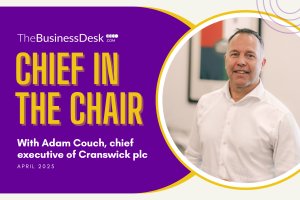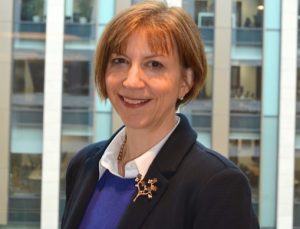The serial entrepreneur who is showing no signs of getting off the treadmill

EY and TheBusinessDesk.com are working together on a series celebrating some of the region’s most successful entrepreneurs, looking at their journey to the top and the challenges they have overcome as their business has grown and developed. The second in the series is with serial entrepreneur Peter Roberts, who is the driving force behind the phenomenal growth of Pure Gym.
“WE basically pinched other people’s ideas,” admitted Pure Gym’s executive chairman Peter Roberts.
As founder stories go, what it lacks in lightning-bolt inspiration it makes up for with its honesty. But it is typical of the matter-of-fact manner in which the serial entrepreneur details his remarkable career.
“I am a not a pioneer,” he said. “You take someone else’s idea and see if you can improve it.”
Mr Roberts had sold his budget hotel group Golden Tulip to Whitbread for £44m in September 2007 and found he was “kicking his heels about” when someone asked him if he had “heard about those low-cost gyms”.
He had some experience in the sector, having been chairman of Dragons Health Clubs, which was started by the same person who would go on to launch The Gym Group.
Pure Gym is his latest venture which has already resulted in his original investors exiting with 18 times their money. It simply took the low-cost gym model that was prevalent in the United States, Germany and Scandinavia and placed it into the UK just as the credit crunch was starting to hit consumer spending.
“It confounded me why it hadn’t come to the UK,” he said. “It almost seemed too good to be true. We were right in the heart of the recession and we could offer people really good value.”
 Enough money was raised initially to fund four gyms – its first was next to the Corn Exchange in Leeds, while the other three were located near offices in Manchester, on a retail park in Wolverhampton, and close to students in Edinburgh.
Enough money was raised initially to fund four gyms – its first was next to the Corn Exchange in Leeds, while the other three were located near offices in Manchester, on a retail park in Wolverhampton, and close to students in Edinburgh.“We were testing what worked – and all four worked,” he said. “The biggest problem we had is that people thought it must be rubbish. We quickly learned it was all aout referral and making an offer.
“They all did extremely well. We made a few mistakes in terms of buildings, but put them right and starting rolling it out.”
The original plan was to have 20 gyms, but six years after launch the chain’s website now boasts 128 gyms with a further 29 opening soon. When it reached 65 gyms, private equity group CCMP bought it in a £118m deal.
“Did we go out too early?”, he asked, rhetorically. “You have to leave something in for the next guy.
“The way you go about it is important. There’s no point in screwing someone down to the last penny. You need to do it so they think they have a reasonable deal as well.”
Mr Roberts learned his negotiations skills in his first job as a chartered surveyor, specialising in rural asset management, which included negotiating rents with Dales farmers.
“I learned to try and get in other people’s minds – what are they thinking, what do they want?” he said.

Despite an entrepreneurial career that started in the 1970s in developing a leisure resort in the Lake District – “we were the second indoor leisure centre in the UK, after Gleneagles”, he recalled – before moving on to hugely successful ventures Luminar and Country Style Inns, he does not have the gung-ho attitude that forms part of the stereotype of the serial entrepreneur.
“I have been quite conservative in my investments,” he said. “There have been times when I could have been a bit more adventurous but I have always been conscious of not wanting to lose other people’s money.”
Mr Roberts, who was educated at Charterhouse, grew up surrounded by entrepreneurial spirit in the family. He describes his uncle and father as “great entrepreneurs”, who started Halifax Dairies – that, via Associated Dairies, became part of Asda – and developed a hotel in London which was sold to Forte.
He believes that being an entrepreneur is not something that can be taught, but has much more to do with instinct and attitude.
He said: “I’m convinced it is in the blood. You have to be really hungry, you have to be prepared to work hard. There are a lot of challenges out there – it’s about energy.”
And he has no concerns about the pipeline of future homegrown entrepreneurs.
“I think there’s a lot more entrepreneurial spirit than people are aware of,” he said. “The UK is quite an entrepreneurial place, the character of the people is just that.”







